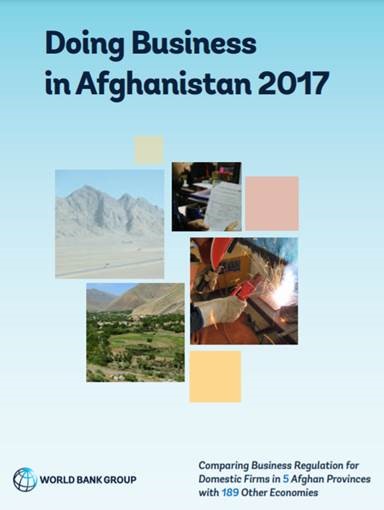Overview
Doing Business in Afghanistan 2017, is the first report of the subnational Doing Business series in Afghanistan. It measures business regulations and their enforcement in 5 provinces: Balkh (Mazar-i-Sharif), Herat (Herat), Kabul (Kabul), Kandahar (Kandahar), Nangarhar (Jalalabad). The report measures regulations affecting 4 stages of the life of a small or medium-size business: starting a business, dealing with construction permits, getting electricity and registering property.
 Where is it easiest to do business in Afghanistan?
Where is it easiest to do business in Afghanistan?
Main Findings
- The Doing Business in Afghanistan 2017 measures 5 provinces, including 4 provinces for the first time.
- Afghan entrepreneurs face different regulatory hurdles depending on where they establish their businesses. Regulatory quality and efficiency vary across locations in the four areas benchmarked because of differences in local interpretations of the law and in the efficiency of local agencies responsible for administering regulation.
- Good practices can be found across Afghanistan in all four areas of regulation. Reform-minded policy makers can make tangible improvements by replicating measures already successfully implemented within the country. In areas of regulation where there is more subnational autonomy, local agencies in other provinces offer examples of good practice in how to reduce the time, cost and complexity of bureaucratic processes.
- By adopting all the good practices found at the subnational level, Afghanistan would move substantially closer to the frontier of regulatory best practices—and jump 11 places in the global ranking of 190 economies on the ease of doing business, moving up from 183 to 172.
- Kabul’s top rankings in starting a business and getting electricity reflect reforms that were implemented only in the capital. Rolling these reforms out across Afghanistan would benefit entrepreneurs in other provinces and urban centers.
- Critical challenges remain. It is important, at first to strengthen the legitimacy, accountability and capacity of the public sector at the subnational level by reducing overlapping institutional mandates and by clarifying unclear roles and responsibilities. Stronger local governments would enhance efficiency in the provinces and at the same time liberate resources in Kabul, where many bureaucratic processes are centralized.

